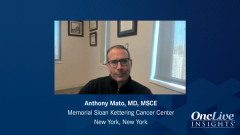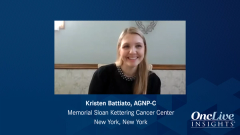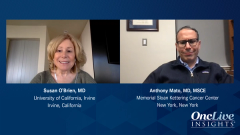
Frontline Targeted Therapy for Newly Diagnosed High-Risk CLL
Frontline therapies available to treat newly diagnosed high-risk chronic lymphocytic leukemia, and the rationale for selecting a targeted therapy versus chemoimmunotherapy as initial treatment.
Episodes in this series

Susan O’Brien, MD: So now we have this high-risk patient. What are your thoughts in terms of what are you thinking about treatment and what are the important characteristics here that lead you to that? Is it the mutation status, the FISH [fluorescence in situ hybridization]? We did not hear about any comorbidities, and this patient is relatively young. I'm going to assume in this case, it's probably going to be more related to the disease characteristics.
Anthony Mato, MD, MSCE: I think the easiest part of the treatment decision-making is to determine what I wouldn't give this patient. For me, chemoimmunotherapy is absolutely off the table for this patient based on the IGHV [immunoglobulin heavy chain]status alone, but then add the deletion 17p and it's no longer even a standard of care consideration. I think we're having a conversation about which targeted therapy would be the best particular fit for this patient. There's 2 possible pathways, either BTK inhibitor-based therapy, and we have 2 choices. Ibrutinib and acalabrutinib or BCL2 inhibitor, which would be venetoclax with obinutuzumab. I think the general direction that the wind is blowing for a patient who has a deletion 17p is that a minimum people feel that they require continuous therapy. The BTK inhibitors have been studied in that way, and so that's generally what people are picking in this particular situation. Now, whether you choose ibrutinib or acalabrutinib, we can have that conversation, but I think venetoclax obinutuzumab, it isn't absolutely off the table, but it hasn't performed that well as a time-limited therapy in a very small number of patients with the deletion 17p. So, I would probably lean towards a BTK inhibitor for this patient. In the absence of comorbidities, either ibrutinib or acalabrutinib would be a reasonable choice. I tend to use more acalabrutinib these days based on the more favorable adverse event profile that it seems to have.
Susan O’Brien, MD: We have seen some long-term data for 17p patients with ibrutinib and not quite as long-term data, but 4 year data with venetoclax. As you were alluding to, if we look at a poster that was at ASH [American Society of Hematology annual meeting] last year, that poster combined 4 trials that included frontline patients with either 17p or p53 deletion treated with ibrutinib. And that was really important is because as we just discussed, this is an uncommon group upfront. Any given trial doesn't have that many patients. So really up until that poster at ASH, the largest series that we had was a letter to the editor from [Dr.] Adrian Wiestner’s group at the NIH [National Institutes of Health]. That was 34 frontline patients with the 17p deletion or p53 abnormality. By combining the data from the 4 trials, that cohort went up to 89. That data looked really stupendous. At 4 years, follow-up, the median and PFS [progression-free survival] had not been reached in that high-risk group. The 4 year PFS was about 78%, which is about what it was for the total population in the RESONATE-2 trial. That was the trial that compared to ibrutinib to chlorambucil and led to the approval of ibrutinib as a frontline therapy, so, really looking not so much like a high-risk group with the BTK inhibitors. With the venetoclax obinutuzumab, yes, there was a median reached at 4 years in that group. It was about 4 years, so it was pretty good data and much better than chemotherapy as you alluded to. But it didn't appear to be as good as the ibrutinib data. Now, as you also alluded to, Anthony, is it that the venetoclax is not as an effective a drug in that setting or is it simply that stopping therapy is not a good idea? I think it's hard to know, but I totally agree with you that my bias in that setting would definitely be towards a BTK inhibitor.
Transcript edited for clarity.



































